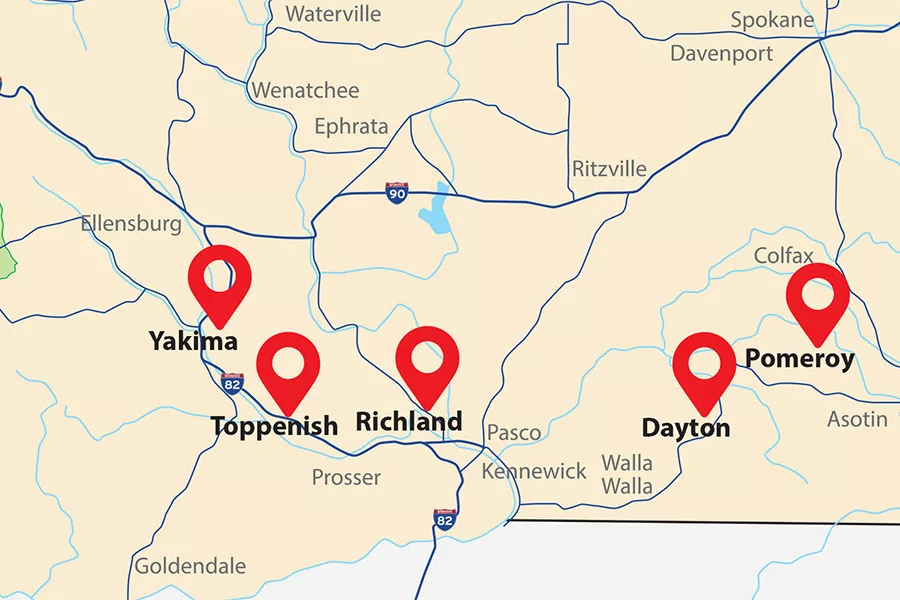
Home » Feds terminate leases around region, including in Richland
Feds terminate leases around region, including in Richland

The U.S. General Services Administration, at the direction of the Elon Musk-led U.S. Department of Government Efficiency, has canceled five federal leases in Eastern Washington. Those leased spaces are home to a variety of federal agencies. No information is available regarding plans for relocating them and the impact to their services.
Map by Vanessa GuzmánMarch 13, 2025
Port of Columbia leaders had no reason to suspect that they were about to lose one of their primary tenants on Feb. 25.
That was the day the U.S. General Services Administration conducted its annual inspection of the 4,350-square-foot space it leases in Dayton for use by the U.S. Department of Agriculture’s local Farm Service Agency and Natural Resource Conversation Service staff.
“They did it via telephone because their travel had been cut,” Jennie Dickinson, the port’s executive director, said of the GSA staff based in Spokane. The inspection was uneventful, she noted.
The next day, the letter terminating the lease arrived, effective Aug. 31. As for the two agency offices staffed by six people, neither they nor anyone else in the small community knows what’s coming next.
“It’s a lot. They’re our friends. They don’t know what’s happening,” Dickinson told the Tri-Cities Area Journal of Business. “They don’t know if they’re being terminated or being sent into a different town to work.”
The port’s lease was among four others canceled in the region included on a Department of Government Efficiency (DOGE) list compiled to meet the Trump administration cost-saving goals. The other leases are:
- A Richland office of the U.S. Department of Labor tasked with assisting U.S. Department of Energy workers pursuing worker compensation claims. The Hanford Resource Center is at 303 Bradley Blvd., Suite 206.
- The U.S. Bureau of Indian Affairs agency office for the Yakama Nation in Toppenish.
- A Yakima facility of the Drug Enforcement Administration’s Seattle division.
- A ranger station of the Umatilla National Forest in Pomeroy.
The move leaves more questions than answers.
Information posted by DOGE indicates terminating the five leases will result in a total savings of $1.52 million
But there are conflicting details on how much of those savings were a direct result of DOGE’s efforts, whether terminating the leases will yield any savings at all or whether the federal government intends to renegotiate the leases in the end.
“We have a wait-and-see approach,” said Diana Ruchert, manager of the Port of Garfield, which leases property for the Umatilla National Forest ranger station in Pomeroy, about 100 miles east of the Tri-Cities.
And some federal workers assigned to the offices appear to be in the dark about the lease cancellations.
“That’s news to us,” said a staff member at the Hanford Resource Center’s 1,000-square-foot office just off George Washington Way.
Hanford Resource Center
The Hanford Resource Center’s lease, at an annual cost of $19,539, had an expiration date of July 2028. DOGE said the lease cancellation will save $53,733. The center is one of 11 facilities for DOL’s Office of Worker Compensation Programs, with the next closest offices in Idaho Falls, a more than eight-hour drive away.
Staff for the center’s property owner, Jerry D. Abrams Company Inc. of Richland, declined to comment when contacted by the Journal.
The Journal also reached out to the center’s manager for comment. That request was passed on to a DOL spokesperson who indicated leasing decisions were the responsibility of the GSA. The Journal contacted the GSA to find out if the center was being relocated to another facility, when that relocation would take place and how that relocation is expected to impact services.
In response, a GSA spokesperson said that GSA Acting Administrator Stephen Ehikian is seeking to reduce deferred maintenance liabilities, support the return to office of federal employees and take advantage of a stronger private/government partnership in workforce management. And that’s leading GSA to review “all options to optimize our footprint and building utilization,” including termination of soft term leases.
“To the extent these terminations affect public facing facilities and/or existing tenants, we are working with our agency partners to secure suitable alternative space,” the spokesperson said in a statement. “In many cases this will allow us to increase space utilization and obtain improved terms.”
DOGE lease terminations
DOGE is led by tech billionaire Elon Musk. As of March 11, the DOGE website displayed 748 lease terminations totaling 9.6 million square feet of office, warehouse and other spaces for savings of approximately $468 million. On March 4, the website listed the same number of leases and square footage as generating approximately $660 million in lease savings.
Of the 191 federally-leased properties in Washington state identified by the GSA in January, 15 were on DOGE’s lease cancellation list.
All five of the properties in the southeastern quadrant of the state were beyond their termination right dates, according to GSA data. That means they were in the soft term of their leases.
Nationally, DOGE’s published information on contracts, leases and layoffs has generated questions about the accuracy of the information. There is also criticism that cutting agency office space contradicts Trump’s order for federal workers to return to in-office work.
U.S. Sen. Patty Murray criticized the Trump administration and DOGE for not being transparent in its efforts and undermining Congress’ authority when it came to the national budget.
“We’ve had contracts that have been recklessly canceled, some accidentally and then restarted – not to mention the workers who have been fired and rehired,” she said in a statement.
Federal departments and agencies have millions of dollars in annual lease contracts still in place in the Tri-Cities. The largest of those are for DOE’s office buildings at Stevens Center in Richland’s Tri-Cities Research District but there are also Kennewick offices for the Social Security Administration and U.S. Geological Survey, and NOAA’s Northwest Fisheries Science Center in Pasco.
There are also several federally-owned properties in the region, such as the Hanford site, Pacific Northwest National Laboratory, the federal courthouse and office building in central Richland and undeveloped parcels. No properties in the region were listed on the “non-core property list” published by GSA as properties for sale before the list was removed from the agency’s website on March 4.
Regional leases
The terminated lease for a resident office of the DEA’s Seattle division in Yakima was set to expire at the end of October 2025 and had no renewal options remaining.
The Yakima property’s owner, Schumacher Leasing, told the Journal that it received a termination notice but declined to comment further.
Yakama Nation officials reported they received a letter on Feb. 28 terminating the lease for more than 17,000 square feet of space in their headquarters used by BIA as one of its 14 agency offices in the Northwest region.
The letter indicated the lease termination is effective Sept. 25, more than two years before it was scheduled to expire. The lease also had five renewal options remaining. The annual lease was $533,985 but DOGE lists the savings from terminating that lease as $0 on its website.
According to the Yakama Nation, the BIA agency office houses 85 federal workers providing services and support in areas such as administration, human services and natural resources. Those roles are required by the 1855 treaty between the Yakama Nation and U.S. government, tribal officials said.
“At this time, no official communication surrounding the reasoning or intentions for the lease termination has been provided directly to the Yakama Nation government,” the Yakama Nation said in a statement. “The Yakama Nation Tribal Council and administration are actively monitoring and assessing the GSA’s decision in efforts to prepare for the expected impacts the termination may have on the Yakama community.”
Cancellation vs. renegotiation
Ruchert said the Port of Garfield has received the letter of intent to terminate the lease on the ranger station at the end of its current term, Sept. 30. However, a shop facility also leased by the U.S. Forest Service remains in place with no notice to cancel.
Staff at the ranger station has shrunk over the years, Ruchert said, and “if I were the president, I would want to renegotiate.” The building is more than 10,000 square feet and is the source of the bulk of the reported savings of the canceled leases in the region at $1.45 million.
However, Pomeroy remains a staging area for wildland firefighters and there are indications there’s a desire to have a larger presence of these first responders in the area.
“They haven’t let anyone from fire go, so those people will have to be relocated somewhere,” Ruchert said.
No other action has been taken by federal officials, including steps usually taken when property is going to be vacated, such as walk-throughs and phone service cancellation, Ruchert said.
While not sure of outcome, Ruchert said she expects the federal government to either seek to renegotiate its lease, pursue a smaller space or combine the ranger station with one of the other three in the Umatilla National Forest.
‘Dangerous way to do business’
Ten years ago the FSA and NRCS were looking for a new space, as their former offices in the old post office in Dayton weren’t meeting their needs, Dickinson said. The Port of Columbia took out a loan for a $250,000 renovation of the facility they now use on Cameron Street.
“They have very specific requirements, down to the hinges on the doors,” she said.
The lease termination is a shock to the port, she said. Though it was set to expire in October, there were still renewal options. By canceling the $41,342 annual lease for the space two months early, DOGE estimates the federal government can save $3,445.
Dickinson said that she’s glad the port paid off the loan for the renovation last year. When asked if the lease termination could be the beginning of the federal government’s efforts to renegotiate the lease as Ruchert suspects in Pomeroy, Dickinson said she never considered it.
“That’s a dangerous way to do business,” she said.
However, the situation has raised other urgent questions about not just what will happen to the staff currently housed at the facility, but other federal workers in town and entities that receive substantial federal support.
Dickinson said roughly 30% of Dayton’s population is employed by the federal government, including staff who work for the U.S. Corps of Engineers at Little Goose Dam on the Snake River and the BPA workers who support the power generated and transmitted through the area.
Federal Title 1 funds support special education at the town’s schools and Medicare and Medicaid are a significant revenue source for the local hospital district.
“The port is at the bottom of my list. I’m worried about the community,” Dickinson said.
Latest News Real Estate & Construction Local News Hanford
KEYWORDS March 2025
Related Articles
Related Products





